The Druze: Who They Are, Their Biblical Bond with the Jews, and the Tragedy Unfolding in Syria
As violence in Suwayda province claims 350+ lives, Israel's military response showcases an unprecedented commitment to the Druze
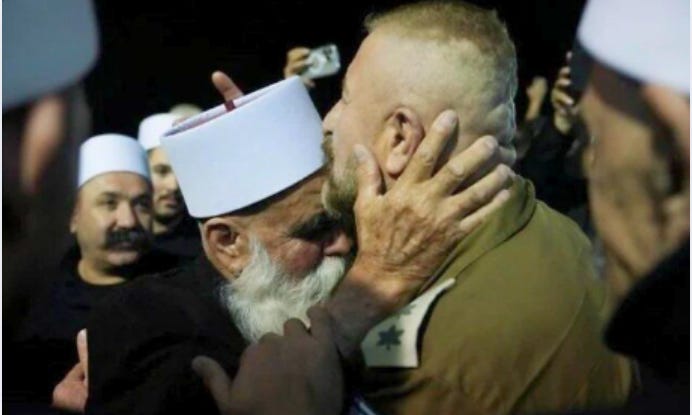
The hills of southern Syria have seen a sharp escalation in violence, particularly affecting the Druze—a minority community with deep roots in the region’s history. In recent weeks, reports confirm that over 350 people have been killed in Syria’s Suwayda province.
As the conflict continues, Israel has conducted targeted military operations along the Syrian border, specifically aiming to prevent further attacks against Druze areas. Prime Minister Benjamin Netanyahu has emphasized that these moves reflect Israel’s commitment to the Druze people, underlining a longstanding alliance and the prominent role Druze citizens play in Israeli society. Israel’s actions, unprecedented in their explicit cross-border motivation to defend a minority, have included airstrikes to halt incursions by hostile forces perceived as threats to Druze safety in Syria.
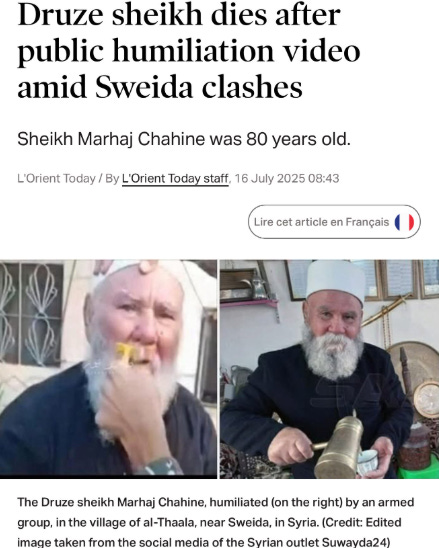
Who Are the Druze? Demographics, Faith, and Tradition
The Druze, numbering between 800,000 and 1.5 million worldwide, are concentrated primarily in Lebanon, Syria, and Israel, with several smaller diaspora communities overseas. In Syria, Suwayda province and surrounding areas have historically been major Druze population centers. The Druze religion is distinctively monotheistic and esoteric, open only to those born into the community. Religious doctrine, transmitted orally among the initiated, emphasizes belief in the unity of God, the transmigration of souls reincarnation, and the pursuit of ethical living. The community’s insular religious practices have enabled preservation of traditions amid external pressures, but have also contributed to perceptions of difference in a region often marked by sectarian conflict.
Druze tend to live in mountainous locations, which have historically afforded both physical protection and a buffer for maintaining autonomy. Their communities typically maintain loyalty to the nation-state in which they reside, and Druze are known for their strong participation in public service, including high rates of military and civil engagement in Israel, for example.
While the Druze have often managed to remain politically neutral in broader sectarian conflicts, recent developments in Syria have exposed them to acute risk. Extremist groups and Islamist factions view the Druze as religious dissenters, or “heretics,” leading to targeted attacks including the desecration of shrines and direct assaults on village leaders. These acts have included forced shavings of beards and mustaches—a symbolic violation aimed at spiritually and socially degrading Druze elders.
Biblical Connection: The Children of Jethro
The Druze community's most profound connection to Jewish history lies in their identification as the spiritual descendants of Jethro, Moses' father-in-law and priest of Midian. According to both biblical narrative and Druze tradition, Jethro provided crucial guidance to Moses, including the establishment of a judicial system that would become fundamental to Jewish law and governance. The Druze venerate Jethro as their founding prophet, creating a deep kinship through the marriage of his daughter Zipporah and Moses.
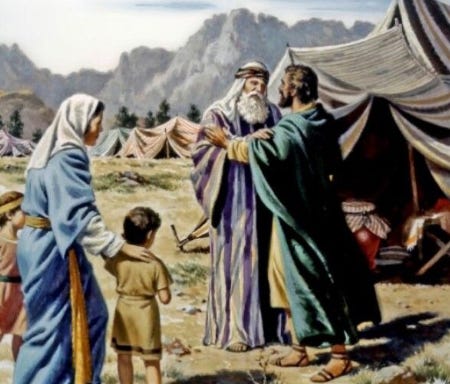
This biblical connection transcends mere historical interest, representing a bond between two ethno-religious communities that have faced similar challenges of minority survival in the Middle East. Cultural collaboration has continued into the modern period; for example, Israel’s national anthem “Hatikvah” was written by Naftali Herz Imber who resided, upon arriving in Israel, in the Druze village of Daliyat al-Karmel.
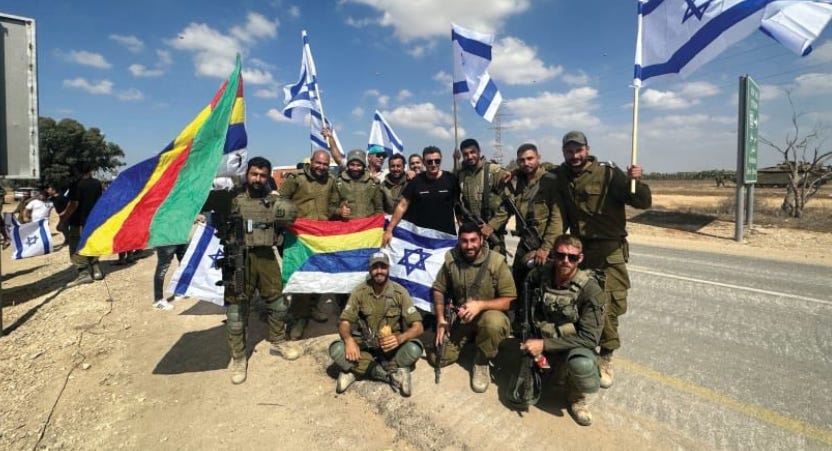
Druze in Israel: Citizenship, Villages, and Service
In Israel, the Druze community numbers about 152,000, residing in at least eighteen villages predominantly in Galilee, Mount Carmel, and the Golan Heights. Israeli Druze have been recognized for their integration in all sectors—military, education, politics, and civil society. They have their own religious courts and educational systems and serve at high rates in the Israel Defense Forces.
Nonetheless, many Druze in the Golan Heights—including communities that came under Israeli control after 1967—have traditionally opted against acquiring Israeli citizenship, often citing the need to protect relatives and property in Syria. However, as Syria’s civil conflict has escalated, increasing numbers are applying for and receiving Israeli citizenship, reflecting both practical and security considerations.
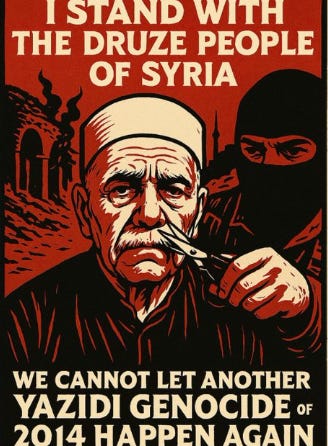
Response to Massacres in Syria
The current persecution of Syrian Druze appears to be motivated by theological differences, with documented evidence that Sunni extremist groups view Druze beliefs as heretical. Syria's transitional government, led by Ahmed al-Sharaa, has reportedly struggled to control extremist elements within its coalition, resulting in systematic attacks on Druze communities in Suwayda province. These attacks serve dual purposes: eliminating perceived religious apostasy and removing potential sources of resistance to centralized authority. Attacks have also been reported against other minority groups in Syria, including Christians and Alawites.
Israel intervened militarily on July 15, 2025, striking Syrian forces and military vehicles approaching Druze areas in Suwayda province. The IDF reported striking "several tanks", specifically "to prevent their arrival" at sites where Syrian forces were engaging Druze militias.
International reaction to Israel's intervention has been notably muted. Syria's foreign ministry issued a statement condemning the Israeli attacks as "a blatant violation of the sovereignty of the Syrian Arab Republic" and "a reprehensible example of ongoing aggression and foreign interference in the internal affairs of sovereign states."
The Syrian Druze crisis provides a case study in how ancient ethnoreligious connections continue to influence contemporary international relations, particularly in contexts where traditional diplomatic mechanisms prove inadequate for minority protection.



It’s enlightening to learn of the role of the Druze in Israel. I knew a fair amount about the Lebanese Druze and only heard of the Syrian Druze through the history of local conflicts in sectarian and volatile Syria
World opinion is influenced by heavy exposure to emotive images and narratives not by principles. Therefore world opinion will not be favourable towards the Druze anytime soon. It took the Palestinians decades to build up a critical mass of a well constructed emotive cache before the world dialled up its hostility to Israel by orders of magnitude.
World opinion also appears to be a weak currency. Geopolitics does not care that much for public opinion. Thats particularly so in countries such as the US who are heavily invested in multiple localities in the Middle East.
Is it a big loss that the world is not empathising with all minorities and appears only capable of selective empathy towards one particular grievance in the Middle East: Palestine?
As far as the Middle East goes it is the local balance of power and common interests is what shapes the realities on the ground.